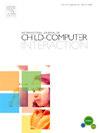Fab实验室中基于设计的研究和设计思维:在儿童和青少年中开发一种激发授权制作活动的干预措施
Q1 Social Sciences
International Journal of Child-Computer Interaction
Pub Date : 2025-07-12
DOI:10.1016/j.ijcci.2025.100763
引用次数: 0
摘要
为了在快速变化的世界中茁壮成长,孩子们需要发展能动性的机会。Fab Labs和创客空间配备了数字制造工具,为孩子们提供了强大的环境,在这里他们可以设计和建造自己的作品,同时培养STEM能力。本研究探讨了在这样的环境中如何通过让儿童积极参与基于自决理论的共同创造和参与性干预来培养能动性。采用基于设计的研究方法,对N = 66名9-13岁的儿童和青少年进行了为期四周的系列研讨会的三次迭代。设计思维为孩子们产生和追求自己的想法提供了一个指导结构,也为导师提供了一个支持开放式过程的指导结构。研究结果表明,参与者成功地参与了自主和独立的制作活动,体验了代理,并继续参与。该研究展示了Fab Labs在促进自我监管方面的潜力,并强调了开发赋权干预措施的迭代、参与式方法的重要性。它有助于促进非正式STEM教育的公平性,并提供理论和实践意义,以及进一步的研究途径。本文章由计算机程序翻译,如有差异,请以英文原文为准。
Design-based research and design thinking in the Fab Lab: Developing an intervention to spark empowering making activities among children and adolescents
To thrive in a rapidly changing world, children need opportunities to develop agency. Fab Labs and makerspaces, equipped with digital fabrication tools, offer empowering settings where children can design and build their own creations while developing STEM competencies. This study investigates how making activities in such settings can foster agency by engaging children as active participants in a co-creative and participatory intervention grounded in Self-Determination Theory. Using a design-based research approach, three iterations of a four-week workshop series were conducted with N = 66 children and adolescents aged 9–13. Design thinking provided a guiding structure for children to generate and pursue their own ideas and for mentors to support the open-ended processes. Findings show that participants successfully engaged in self-directed and independent making activities, experienced agency, and continued their engagement. The study demonstrates the potential of Fab Labs to foster self-regulation and highlights the importance of iterative, participatory approaches for developing empowering interventions. It contributes to promoting equity in informal STEM education and offers both theoretical and practical implications, as well as further avenues for research.
求助全文
通过发布文献求助,成功后即可免费获取论文全文。
去求助
来源期刊

International Journal of Child-Computer Interaction
Social Sciences-Education
CiteScore
7.20
自引率
0.00%
发文量
73
 求助内容:
求助内容: 应助结果提醒方式:
应助结果提醒方式:


